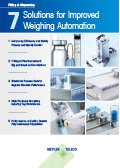
Case Study Collection
Standardized interfaces allow for easy communication with control systems. The proven ruggedness and the worldwide service network guarantee reliable operation for many years. Furthermore explore seven reasons why METTLER TOLEDO load cells are the right choice for your next project:
7 Reasons to Use Automated Precision Weighing
- Plug & communication with common PLC systems for easy integration
- Comprehensive overload protection to assure high uptime
- Fast weighing to enable high throughput rates
- Functionality tests with calibration weights can be performed at any time for accuracy assurance
- Protection allows rinsing with liquid for clean-in-place to maximize efficiency and uptime
- Multiple designs allow for easy mechanical integration into machines
- Fully automated preparation for performance in quality control
Download the case study collection now
In various industries, volumetric filling is typically followed by a gross-weight check with a high precision weigh module. Weigh modules and load cells help to make process control easy and fast while ensuring the fill quality of syringes, vials, ampoules, cells and capsules.
For expert insights, download the case study collection highlighting the successes of other machine and instrument builders.
Load Cells Weighing Enabling Everyday Products
Machine and instrument manufacturers supplying the Chemical, Food and Pharmaceutical industries need tailored weighing components. These machines are typically used to produce products like high precision load cell, that we all use every day. Automated precision weigh modules from METTLER TOLEDO offer versatile mechanical, electrical and software features for easy integration.
Electrolyte Filling sets the Benchmark for Battery Quality
From raw materials to a high-quality product, a lithium ion battery has to run through as many as 25 production steps. The most crucial ones lay the foundation for high performance.
Filling the electrolyte into the cell is a critical process step that sets the foundation for the full functionality of every cell. As such, machine builders must balance high throughput and maximizing production yield. This balance can be achieved with highly accurate load cells in the electrolyte fill step.

